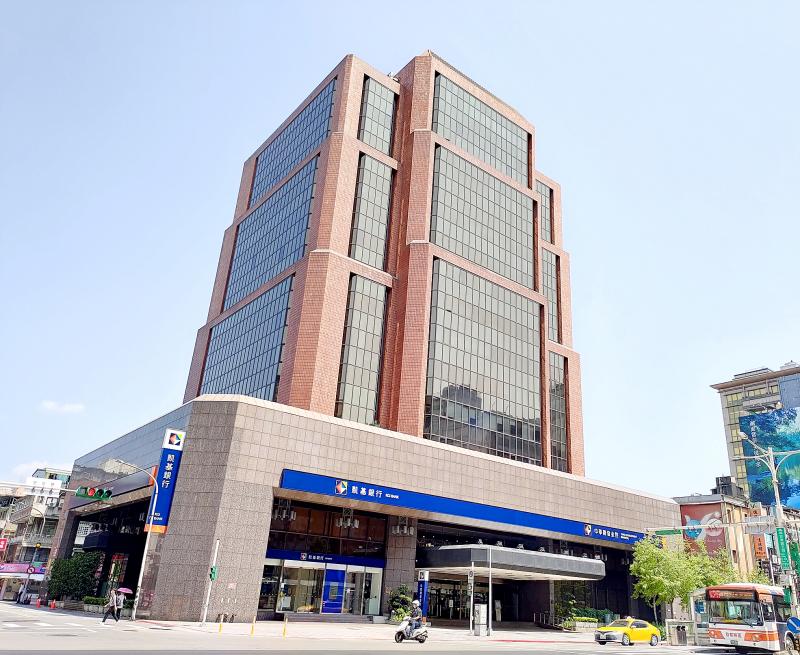Shin Kong Life Insurance Co (新光人壽) on Tuesday won a bid for the China Development Financial Holding Corp (中華開發金控) headquarters with an offer of NT$9.28 billion (US$326.24 million), beating a bid by China Life Insurance Co (中國人壽).
The life insurance arm of Shin Kong Financial Holding Co (新光金控) would use the building — on Nanjing E Road in Taipei’s Songshan District (松山) — as office space for its own use for the first five years, Shin Kong Financial spokesperson Sunny Hsu (徐順鋆) said by telephone yesterday.
The building would accommodate its employees or those of its affiliates, such as Shinkong Insurance Co (新光產險) and Shinkong Synthetic Fibers Corp (新光合成纖維), as those subsidiaries’ buildings are to be rebuilt over the next few years, Hsu said.

Photo courtesy of Cushman & Wakefield Taiwan
“The 35-year-old building is not unsafe or old, but after five years, we would consider rebuilding it via urban renewal and building a new commercial venue to earn stable rental income,” Hsu said.
With the incentives for urban renewal, Shin Kong Life expects to build a 19-story building with a total floor area of 9,700 ping (32,066m2) compared with the current 16-story building’s 8,000 ping, he said.
A preliminary estimate indicates that the new building would generate a higher rate of return than the regulatory minimum, Hsu said.
Shin Kong Life, which owns six buildings along Nanjing W and Nanjing E roads in Datong (大同), Zhongshan (中山) and Songshan districts, expects demand for office space in the area to gain momentum, Hsu said.
The company aims to revitalize its other 190 buildings this year, he said.
It would talk with China Development Financial to decide a timeframe for handing over the building, as its employees still work in the building while the firm’s new headquarters is being finished, he said.
China Development Financial, the parent company of the building’s owner, CDIB Capital Group (中華開發資本), would recognize disposal gains of NT$8 billion from the deal, China Development Financial said in a filing on Tuesday.
“We could not fully recognize the NT$9.28 billion, as we needed to subtract the building’s construction costs from the bid price,” China Development Financial spokesman Richard Chang (張立筌) said by telephone.
It would recognize the disposal gains when receiving the payments, while Shin Kong Life would pay in four installments, Chang said.
The proceeds from the auction would not be used to acquire a greater stake of China Life Insurance via a public tender offer, Chang said, referencing a Financial Supervisory Commission order, adding that they would boost China Development Financial’s return on equity.

With this year’s Semicon Taiwan trade show set to kick off on Wednesday, market attention has turned to the mass production of advanced packaging technologies and capacity expansion in Taiwan and the US. With traditional scaling reaching physical limits, heterogeneous integration and packaging technologies have emerged as key solutions. Surging demand for artificial intelligence (AI), high-performance computing (HPC) and high-bandwidth memory (HBM) chips has put technologies such as chip-on-wafer-on-substrate (CoWoS), integrated fan-out (InFO), system on integrated chips (SoIC), 3D IC and fan-out panel-level packaging (FOPLP) at the center of semiconductor innovation, making them a major focus at this year’s trade show, according

DEBUT: The trade show is to feature 17 national pavilions, a new high for the event, including from Canada, Costa Rica, Lithuania, Sweden and Vietnam for the first time The Semicon Taiwan trade show, which opens on Wednesday, is expected to see a new high in the number of exhibitors and visitors from around the world, said its organizer, SEMI, which has described the annual event as the “Olympics of the semiconductor industry.” SEMI, which represents companies in the electronics manufacturing and design supply chain, and touts the annual exhibition as the most influential semiconductor trade show in the world, said more than 1,200 enterprises from 56 countries are to showcase their innovations across more than 4,100 booths, and that the event could attract 100,000 visitors. This year’s event features 17

EXPORT GROWTH: The AI boom has shortened chip cycles to just one year, putting pressure on chipmakers to accelerate development and expand packaging capacity Developing a localized supply chain for advanced packaging equipment is critical for keeping pace with customers’ increasingly shrinking time-to-market cycles for new artificial intelligence (AI) chips, Taiwan Semiconductor Manufacturing Co (TSMC, 台積電) said yesterday. Spurred on by the AI revolution, customers are accelerating product upgrades to nearly every year, compared with the two to three-year development cadence in the past, TSMC vice president of advanced packaging technology and service Jun He (何軍) said at a 3D IC Global Summit organized by SEMI in Taipei. These shortened cycles put heavy pressure on chipmakers, as the entire process — from chip design to mass

SEMICONDUCTOR SERVICES: A company executive said that Taiwanese firms must think about how to participate in global supply chains and lift their competitiveness Taiwan Semiconductor Manufacturing Co (TSMC, 台積電) yesterday said it expects to launch its first multifunctional service center in Pingtung County in the middle of 2027, in a bid to foster a resilient high-tech facility construction ecosystem. TSMC broached the idea of creating a center two or three years ago when it started building new manufacturing capacity in the US and Japan, the company said. The center, dubbed an “ecosystem park,” would assist local manufacturing facility construction partners to upgrade their capabilities and secure more deals from other global chipmakers such as Intel Corp, Micron Technology Inc and Infineon Technologies AG, TSMC said. It